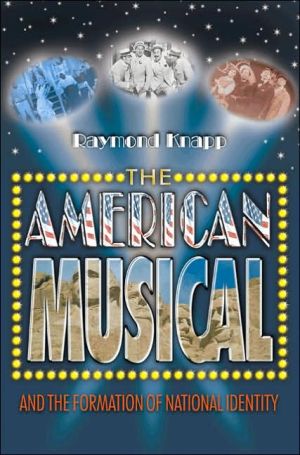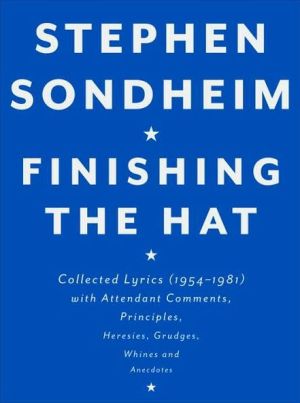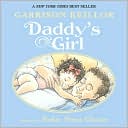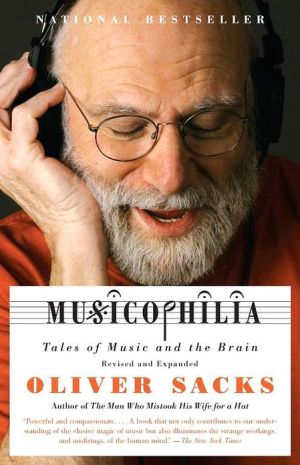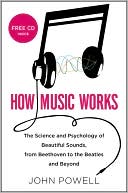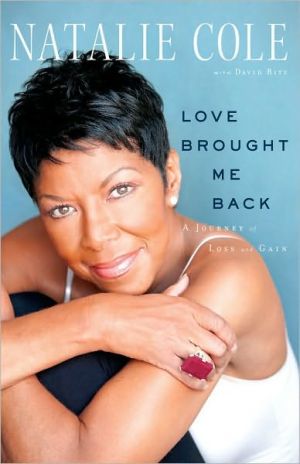The American Musical and the Formation of National Identity
The American musical has achieved and maintained relevance to more people in America than any other performance-based art. This thoughtful history of the genre, intended for readers of all stripes, offers probing discussions of how American musicals, especially through their musical numbers, advance themes related to American national identity.\ Written by a musicologist and supported by a wealth of illustrative audio examples (on the book's website), the book examines key historical...
Search in google:
"A stunningly original, breakthrough book whose contribution to musical scholarship will be substantial and exceptionally valuable. This book moves in directions I had never considered, forcing me to think about musicals in a truly fresh way. The author analyzes the music of this repertory in an ingenious (and highly readable) fashion that consistently illuminates connections to historical and critical ideas. It is thus the first book that succeeds in presenting the music of musical theater as a full-fledged cultural and artistic phenomenon, wholly justifying scholarly scrutiny. A brilliant analysis."--Rose Rosengard Subotnik, Brown University"The most readable, focused, sustained and contextualized study of the genre I've encountered. The author's breadth, experience and reliability as a scholar and teacher shine through on every page."--Stephen Banfield, University of Bristol, UK Charles Hamm - Kurt Weill Newsletter This is an intelligent, extremely well-written study which . . . is as valuable for its demonstration of how musicals may be read as for its own insightful readings.
List of FiguresxiExplanatory Note about Audio ExamplesxiiiPrefacexvPart 1Introductions11Contexts and Strategies32Nineteenth-Century European Roots: Models and Topics19Paris (and Berlin)20The Black Crook (1866)20London: W. S. Gilbert (1836-1911) and Arthur Sullivan (1842-1900)29H.M.S. Pinafore; or, The Lass That Loved a Sailor (1878)343Early American Developments: Minstrelsy, Extravaganza, Pantomime, Burlesque, Vaudeville47Minstrelsy49Extravaganza59Pantomime60Burlesque61Vaudeville62A Gilbert and Sullivan Postscript on American Minstrelsy634American Song through Tin Pan Alley67Minstrel Songs67The Early Tin Pan Alley Era70Classic Tin Pan Alley77Anything Goes (1934)88Part 2Defining America1015Whose (Who's) America?103Little Johnny Jones (1904)104The Cradle Will Rock (1938)1106American Mythologies119Oklahoma! (1943)122Guys and Dolls (1950)134The Music Man (1957)1447Counter-mythologies153Hair (1967-68)154Assassins (1991)162Part 3Managing America's Others1798Race and Ethnicity181Show Boat (1927)185Porgy and Bess (1935)194West Side Story (1957)204Fiddler on the Roof (1964)2159Dealing with the Second World War228The Sound of Music (1959)230Cabaret (1966)23910Exoticism249The Mikado; or, The Town of Titipu (1885)250The King and I (1951)261Pacific Overtures (1976)26811Afterword: Other Directions, Other Identities282Appendix AArt and Commerce: The Business of Making Musicals285Appendix BAdditional Resources289Notes319Bibliography341Index351
\ London Review of BooksKnapp does an excellent job of tracing the roots of the musical, avoiding much of the received wisdom. . . . When Knapp focuses on the structure of musicals, and how it works to move us and persuade us, he is very effective. . . .\ \ \ \ \ HistoryKnapp's well-researched and comprehensive presentation transcends the purely musical point of view. In his exploration of the underlying sociocultural fabric of a number of works, he puts the American musical theater on a par with its contemporary arts of jazz and film.\ \ \ The HistorianThis close musical analysis, combined with broad cultural comments about the power of the American musical, is highly original and much needed, especially as a teaching textbook.\ \ \ \ \ BBC Music MagazineThe breadth of Knapp's reading is astonishing, and his discussion of the historical background of the musical is admirable. . . . Knapp writes extremely well, and not only his thoughts but also his suggestions for further study are well organized. So, too, is his consideration of the growth of the American union in the context of Oklahoma!, Guys and Dolls, and The Music Man.\ \ \ \ \ Kurt Weil NewsletterThis is an intelligent, extremely well-written study which . . . is as valuable for its demonstration of how musicals may be read as for its own insightful readings.\ \ \ \ \ Stage DirectionsRaymond Knapp shows that while some musicals have served to reinforce the way people feel about America, many others have helped to challenge aspects of our culture that needed to be changed.\ \ \ \ \ Current Musicology[Knapp] offers new insights on each work and writes in an accessible, engaging style. . . . Knapp is . . . most effective . . . at negotiating the tensions . . . between work and context, and between part and whole.\ \ \ \ \ Popular Music and SocietyRaymond Knapp has an extraordinarily perceptive ear. As he surveys the history of the American musical, he hears things—important things, revelatory things—that earlier writers who have attempted, systematically, to traverse this vast territory have missed. Hardly a page goes by without a 'Gee, I didn't realize that' moment. . . . One of the loveliest features of these books is the generosity of the musical examples. Coordinated with the text are hundreds of musical excerpts which Princeton University Press has made available to readers through easy downloading from the Internet. . . . It is clear that there is much to praise about Raymond Knapp's work, beginning with his vast knowledge of the subject and his infectious enthusiasm for it.\ \ \ \ \ " London Review of Books hael Friedman\ Knapp does an excellent job of tracing the roots of the musical, avoiding much of the received wisdom. . . . When Knapp focuses on the structure of musicals, and how it works to move us and persuade us, he is very effective. . . .\ \ \ \ \ " History McCoy\ Knapp's well-researched and comprehensive presentation transcends the purely musical point of view. In his exploration of the underlying sociocultural fabric of a number of works, he puts the American musical theater on a par with its contemporary arts of jazz and film.\ \ \ \ \ " The Historian sa Clapp-Itnyre\ This close musical analysis, combined with broad cultural comments about the power of the American musical, is highly original and much needed, especially as a teaching textbook.\ \ \ \ \ BBC Music MagazineThe breadth of Knapp's reading is astonishing, and his discussion of the historical background of the musical is admirable. . . . Knapp writes extremely well, and not only his thoughts but also his suggestions for further study are well organized. So, too, is his consideration of the growth of the American union in the context of Oklahoma!, Guys and Dolls, and The Music Man.\ — Andrew Lamb\ \ \ \ \ Kurt Weil NewsletterThis is an intelligent, extremely well-written study which . . . is as valuable for its demonstration of how musicals may be read as for its own insightful readings.\ — Charles Hamm\ \ \ \ \ Kurt Weill NewsletterThis is an intelligent, extremely well-written study which . . . is as valuable for its demonstration of how musicals may be read as for its own insightful readings.\ — Charles Hamm\ \ \ \ \ Stage DirectionsRaymond Knapp shows that while some musicals have served to reinforce the way people feel about America, many others have helped to challenge aspects of our culture that needed to be changed.\ — Stephen Peithman\ \ \ \ \ Current Musicology[Knapp] offers new insights on each work and writes in an accessible, engaging style. . . . Knapp is . . . most effective . . . at negotiating the tensions . . . between work and context, and between part and whole.\ — Walter Frisch\ \ \ \ \ Popular Music and SocietyRaymond Knapp has an extraordinarily perceptive ear. As he surveys the history of the American musical, he hears things—important things, revelatory things—that earlier writers who have attempted, systematically, to traverse this vast territory have missed. Hardly a page goes by without a 'Gee, I didn't realize that' moment. . . . One of the loveliest features of these books is the generosity of the musical examples. Coordinated with the text are hundreds of musical excerpts which Princeton University Press has made available to readers through easy downloading from the Internet. . . . It is clear that there is much to praise about Raymond Knapp's work, beginning with his vast knowledge of the subject and his infectious enthusiasm for it.\ — Edward Green\ \
